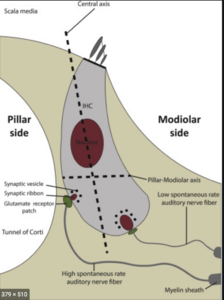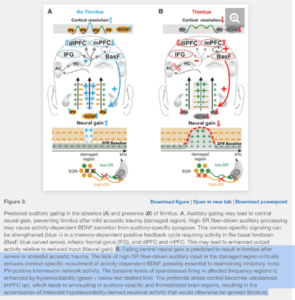- Apr 6, 2020
- 1,033
- Tinnitus Since
- 2016
- Cause of Tinnitus
- 2016: headphones, 2020: worsened thanks to Rammstein
Perhaps old news, but this study by Knipper et al. (2020) mentions interesting factors that possibly contribute to tinnitus by comparing between people with congenital deafness vs. those who acquired deafness.
The authors share the view that the loss of function in auditory nerve fibres entail maladaptive plasticity of two kinds of interneurons (any neuron that acts as an intermediary in passing signals between two other neurons), called the Parvalbumin-positive (PV+) interneurons (responsible for calcium signalling) and the GABAergic interneurons (inhibitory neurons that play a vital role in neural circuitry and activity). The change of these two interneurons seems to play a role in the perception of tinnitus.
The authors share the idea that partially reestablishing the function of damaged auditory nerve fibres with a Cochlear Implant (CI) could undo maladaptive plasticity and consequently alleviate tinnitus.
Knipper et al. recommend that future studies should focus on researching other tinnitus etiologies to help validate the change in PV+ and GABAergic interneurons as causation of tinnitus.
Link:
The Neural Bases of Tinnitus: Lessons from Deafness and Cochlear Implants
The authors share the view that the loss of function in auditory nerve fibres entail maladaptive plasticity of two kinds of interneurons (any neuron that acts as an intermediary in passing signals between two other neurons), called the Parvalbumin-positive (PV+) interneurons (responsible for calcium signalling) and the GABAergic interneurons (inhibitory neurons that play a vital role in neural circuitry and activity). The change of these two interneurons seems to play a role in the perception of tinnitus.
"In conclusion, we consider that congenital deafness (with a low risk of tinnitus) differs from acquired deafness (with high risk of tinnitus). With acquired deafness, the maturation of fast (high-SR) auditory fiber processing and emergence of specific inhibitory PV+ interneuron microcircuits, essential for accentuation of relevant over irrelevant auditory stimuli, have already taken place. This maturation does not occur in congenital deafness because of the lack of auditory experience. In this view, fast (high-SR) auditory fiber characteristics developing after hearing onset provide the drive to establish feedforward and feedback PV+ interneuron microcircuits and to maintain feedback PV+ interneuron microcircuits required for memory-linked reinforcement processes. Upon critical loss of fast (high-SR) auditory fiber processing, hyperexcitability reemerges through loss of tonic PV+ interneuron activity and reversion to depolarizing GABAergic signaling. Tinnitus sufferers cannot ignore the auditory percepts resulting from this hyperexcitability, and this promotes further alertness to the phantom noise.''
The authors share the idea that partially reestablishing the function of damaged auditory nerve fibres with a Cochlear Implant (CI) could undo maladaptive plasticity and consequently alleviate tinnitus.
''Fast (high-SR) auditory fiber processing cannot be lost in either congenital bilateral or single-sided deafness because it was never established. Upon cochlear implantation, however, part of the fast auditory processing circuit may develop or be reestablished, albeit with lower resolution (Fig. 4A, Risk of Tinnitus). In CI-ON mode, electrical stimulation through CI may be able to install context-specific recruitment of contrast amplification mechanisms, enabling the suppression of tinnitus.''
Knipper et al. recommend that future studies should focus on researching other tinnitus etiologies to help validate the change in PV+ and GABAergic interneurons as causation of tinnitus.
''Future studies should investigate whether other tinnitus etiologies (Henry et al., 2014; Moller et al., 2015) may be related to the framework suggested here. In this context, the extreme sensitivity and vulnerability of particular inhibitory PV+ interneuron synapses to any metabolic fatigue or shortfall (Kann, 2016), or the observation that on injury/trauma or glial inflammation a pathologic GABA signaling, that is, excitatory instead of inhibitory (Shih et al., 2017), should be considered as triggers for tinnitus.''
Link:
The Neural Bases of Tinnitus: Lessons from Deafness and Cochlear Implants

 Member
Member
